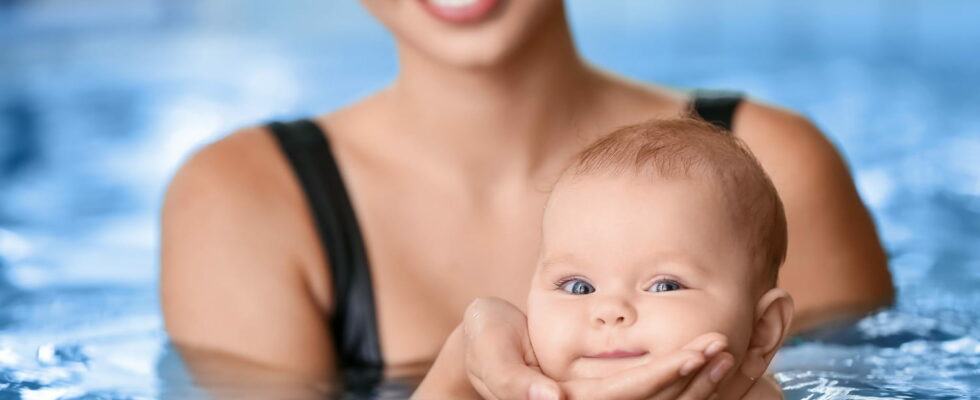There’s nothing like a baby swimming session to gently wake baby up and get him used to the water. From what age can you enroll your baby, what are the benefits of this activity and how do the sessions take place? Answers.
Your baby is growing up and you want to enroll him in a baby swimming session? Once baby has had his first vaccinations, it is possible to have him splash around in the water and introduce him to the aquatic world. Baby swimming sessions promote the awakening of toddlers. It is also a unique opportunity to share a privileged moment with your child by making him discover for the first time, the joys of the swimming pool. Moreover, the baby swim lessons are beneficial to many effects. Even if obviously, some precautions are necessary to take full advantage of this appointment. From what age should you enroll your child in a baby swimming session ? What are the benefits and how are the courses conducted? What you need to know before you start.
At what age should you start a baby swimming session?
Generally, the baby swim lessons are aimed at children from 6 months. Before this age, our infant is more prone to infections, and the mother is not necessarily able to accompany her in the water either. However, the swimming pool can be a source of germs. In addition, it allows to perform the first compulsory vaccinations to validate the registration and in particular the reminder of DTP (diphtheria, tetanus, polio). Sessions that can then continue up to 6 years oldage at which the child can pretend to join a real swimming lesson and learn to swim like a little fish.
How long does a baby swimming session last?
Each session lasts between 30 and 60 minutes, variable time depending on the age of the child. Indeed, a baby under 18 months has difficulty regulating his body temperature and will move less, which can quickly make him cold (even if the temperature of the pelvis is around 35 degrees) hence the interest of do not perform sessions that are too long. If you see that during the first sessions, your baby is too cold, do not hesitate to get out of the water and extend the session the next time.
To begin with, the initiation happens in our arms within a small group of parent-babies, overseen by a swimming instructor. We perform gentle movements so that our little one can tame his environment at his own pace, according to his age and his psychomotor development.
- So, between 4-6 months and 1 yearour baby swimmer learns to maintain his balance in the water, using a mat, then to dive down to us by practicing naturally apnea.
- Around a year, age frequently linked to the first apprehensions of water, the courses focus on games. In a playful setting, the child will thus be more inclined to overcome his fears and jump into the water happily. A way also for him to discover new sensations and have fun.
- Between 15 and 18 monthsin addition to prolonging the pleasure of water, the objective is that our baby sharpens its balance using buoys.
- Around 2 years old, the pool is adorned with slides and tunnels that big babies love. A fun way to land them underwater before we land them. It is also the age of the first splashes which also end head under water before we emerge them!
- Around 3 to 4 years old, our cherub learn to move over a few fathoms (or at least it looks like it) while keeping your head above water.
- Finally, in the last year, when the child has between 5 and 6 years oldhe learns the beginnings of swimming (coordinated movement, adequate movements, underwater breathing, etc.), he is ready to become a future great swimmer!
What are the benefits of a baby swimming session?
If the objective is not to learn to swim, these lessons will allow him to splash around in the water happily, he who spent the first 9 months of his prenatal life in an aquatic environment. As they grow up, these baby swim lessons will help them to retain a taste for bathing, thanks to this regular, secure and fun meeting. Indeed, some children who loved water at birth later start to fear it.
This course is also a good opportunity for parents and children to build a strong relationship during this privileged moment, far from the stress and obligations of everyday life. An activity that will also promote motor skills (in this aquatic universe that he knows well) and his sensory awareness – movements in the water, gravity, water temperature, noise – his self-confidence and his gain of autonomy. Finally, this practice can help our child overcome the anxiety of separation and become more socialized.
What equipment should be provided for a baby swimmer?
Before starting the baby swimming sessionsyou will need to bring some bath accessories:
- A baby bathing suitsome are disposable and fitted with a waterproof layer like Hammock diapers or Huggies. V
- A Bathing cap,
- A bath towel,
- shower gel at the end of the session (you will save time at home)
- a snack, puree of compote or small snack (the swimming pool is hollow!).
Where can I find a baby swimming session?
To discover the list of swimming pools offering baby swimming sessions in France, contact the FAAL (Federation of Aquatic Activities for Awakening and Leisure): www.fael.asso.fr
